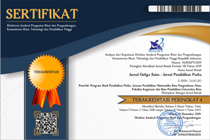THE IMPLEMENTATION OF RECIPROCAL TEACHING LEARNING MODEL TO IMPROVE THE UNDERSTANDING OF PHYSIC CONCEPTS FOR OPTICAL MATERIAL IN CLASS X SMK
Abstract
The still low understanding of the concept of students in vocational schools in learning physics, due to the lack of innovative learning, so it needs innovation such as a reciprocal teaching model that implements four independent understanding strategies, namely summarizing the material, compiling questions, explaining, and predicting. The purpose of this research was to determine the improve in understanding of students' concepts in the class applying the reciprocal teaching model with conventional classes at Vocational High School (SMK) Abdurrab Pekanbaru. The population in this research were 130 students spread over five classes and samples were taken by simple random sampling, so that 2 classes of samples were obtained with 52 students. The research instrument was in the form of concept comprehension test questions consisting of pretest and posttest. The Test in the form of multiple choice reasoned with 4 choices totaling 15 items. The instruments are arranged according to the category of understanding the concepts of translation, interpretation, and extrapolation. Data collection techniques in the form of scores on the concept understanding results obtained from the pretest and posttest scores. The data is processed by descriptive analysis. The results showed that students of class X SMK Abdurrab Pekanbaru in optical material learning, had a difference in increased understanding of concepts. The average score of concept understanding after the implementation of learning in the experimental class was 82.44 with a high category, while the control class was 59.68 with a low category. To that end, the implementation of the reciprocal teaching learning model, is able to better enhance the understanding of physics concepts in optics learning for students in class X SMK Abdurab Pekanbaru.
Keywords
Full Text:
PDFReferences
Afriana, Rovi, 2017. Pengaruh Model Reciprocal Teaching terhadap Hasil Belajar pada Konsep Fluida Statis. Skripsi. Universitas Islam Negeri Syarif Hidayatullah, Jakarta.
Al-Harby, Jubeir Suleiman Samir, 2016. The Effect of Reciprocal-Teaching Strategy on Learning Outcomes and Attitudes of Qassim-University Students in Islamic Culture. Journal of Education and Practice, 7(6): 1-10.
Aris, Shoimin, 2014. 68 Model Pembelajaran Inovatif dalam Kurikulum 2013. Ar-Ruz Media, Yogyakarta.
Berg, E., 1991. Salah Konsep dalam Pendidikan Fisika. UKSW, Salatiga.
Depdiknas, 2003. Undang-Undang nomor 20 Tahun 2003 Tentang Sistem Pendidikan Nasional. Departemen Pendidikan Nasional.
Bungah Justin Efrata, 2014. Peningkatan Hasil Belajar dengan Menggunakan Metode Pembelajaran Terbalik (Reciprocal Teaching) pada Peserta didik Kelas X Teknik Gambar Bangunan untuk Mata Diklat Ilmu Bangunan Gedung di SMK Negeri 5 Surabaya”. Jurnal Kajian Pendidikan Teknik Bangunan, Surabaya, 1(1):14-27.
Fuad, Hasan, 2004. Pendidikan adalah Pembudayaan dalam Pendidikan Manusia Indonesia. Kompas, Jakarta.
Hake R.R., 2002. Relationship of Individual Student Normalized Gain in Mechanics with Gender, High School Physics, and Pretest Score on Mathematic and Spatial Visualization. Diakses pada 10 Maret 2019 dari http:/www.physics.indiana. edu/hake.
Musanni, Susilawati, & Hadiwijaya, A.S., 2015. Pengembangan Bahan Ajar Fisika SMA Berbasis Learning Cycle 3E pada Materi Pokok Teori Kinetik Gas dan Termodinamika. Jurnal Penelitian Pen-didikan IPA, 1(1): 56-64.
Muslimin Ibrahim, & Nur Muhammad. 2007. Penelitian dan Penilaian Pendidikan. Sinar Baru Algensindo, Bandung.
Nurkancana, W., & Sunartama, P., 2003. Evaluasi Hasil Belajar. Usaha Nasional, Surabaya.
Nurwahidah, I., Sarwi, & Handayani, L., 2012. Penerapan Model Pembelajaran Reciprocal Teaching Berbasis Koopera-tif untuk Meningkatkan Pemahaman Konsep Fisika Siswa Kelas X. Unnes Physics Education Journal of Education, 1(2): 25-32. UNNES. Semarang.
Permendikbud, 2014. Peraturan Meteri Pendidikan dan Kebudayaan no. 59 Tahun 2014 Tentang Kurikulum 2013 SMA. Depdikbud, Jakarta.
Rohman & Supari, 2014. Studi Implementasi Empat Pilar Pendidikan Rekomendasi UNESCO Dengan Model PEmbelajaran Berdasarkan Masalah Pada Standar Kompetensi Dasar pada SMK Negeri 7 Surabaya. Jurnal Pendidikan Teknik Elektro, 1(3): 46.
Sugiyono, 2012. Metode Penelitian Pendidikan (Pendekatan Kuantitatif, Kualitatif, R&D). Al-Fabeta, Bandung.
Suparno, P., 2013. Miskonsepsi & Perubahan Konsep dalam Pendidikan Fisika. Gramedia Widiasarana, Jakarta.
Suyatno, 2012. Metode Penelitian Pendidikan dan Pengembangan. Rajawali, Jakarta.
DOI: http://dx.doi.org/10.31258/jgs.7.2.78-86
Refbacks
- There are currently no refbacks.
Copyright (c) 2019 Nadya Hari Pratiwi, M Rahmad, Fakhruddin Z, Kartika Lona

This work is licensed under a Creative Commons Attribution 4.0 International License.
Jurnal ini terdaftar dan terindeks pada:
- Crossref
- Google Scholar
- Crossref
- Garuda
- Sinta
- Researchgate
- Dimensions
- Base
- Scilit
- OneSearch
- Road
- CiteFactor
- ResearchBib
- WorldCat



















